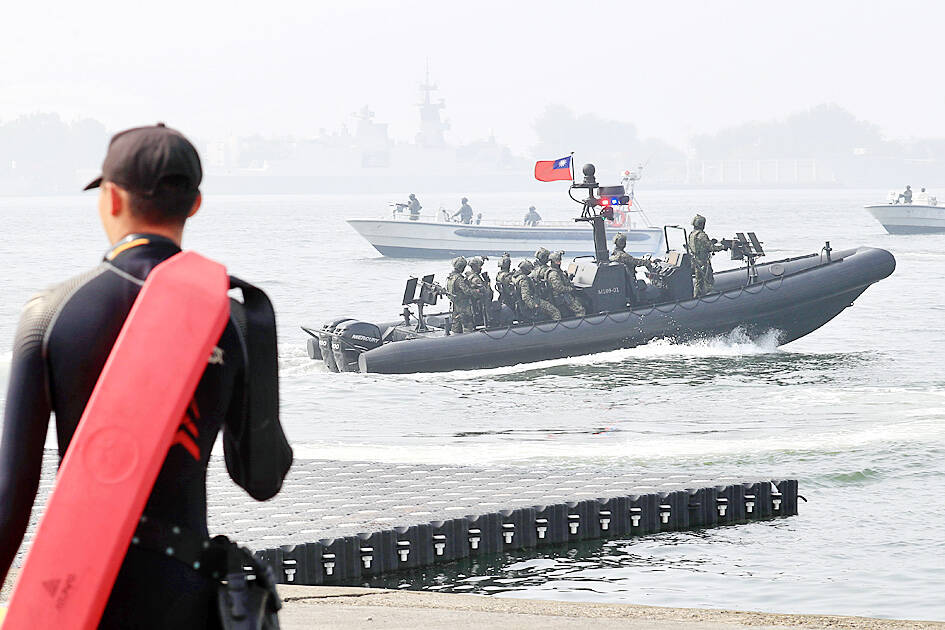Public confidence in the military’s capabilities has risen, with a survey commissioned by the Institute for National Defense and Security Research showing that 45 percent of respondents believe they have improved, up 14 percentage points from the last survey in March.
The poll, conducted from Aug. 23 to Aug. 27 by the Election Study Center of National Chengchi University, suggests that more Taiwanese than ever believe the armed forces are becoming stronger, institute analyst Lee Kuan-chen (李冠成) said in a post on the government think tank’s Web site on Monday.
At the same time, only 32 percent of respondents believe that the military’s capabilities have not improved — the lowest level reported since it began including the question in its survey in September 2021, Lee said.

Photo: Ritchie B. Tongo, EPA-EFE
Previous surveys showed that public confidence in the military appeared to have wavered, possibly due to the Russian invasion of Ukraine and Chinese cognitive warfare to intimidate Taiwan, Lee said.
For example, the percentage of Taiwanese who agreed that the military’s capabilities were improving was 33 percent in March last year, rising to 43 percent in August last year before dipping to 31 percent in March this year, he said.
Asked whether they agree that US military aid increases the chances of war in the Taiwan Strait, 57 percent of respondents said no, down 3 percentage points from March, but the difference is within the margin of error, Lee said.
This suggests that Beijing’s campaign to promote skepticism about the US has not been successful, he said.
Public confidence in the nation’s ability to defend itself has rebounded to 50 percent, up from a low of 43 percent five months ago, he said.
A report by the Nikkei daily in February alleging that up to 90 percent of retired Taiwanese military officers who had traveled to China became spies for Beijing and reports in March that a Taiwanese soldier had allegedly defected by swimming from Kinmen to Xiamen in China’s Fujian Province likely harmed the armed forces’ image, he said.
Last month, during its military exercises, Beijing widely disseminated false information that another Taiwanese soldier had deserted the army and produced a propaganda video comparing the Chinese drills to the goddess Matsu protecting the Taiwan Strait.
This time, Taiwan was quick to respond, issuing statements and releasing images of how the Taiwanese military is monitoring the Chinese exercises, which successfully neutralized the effect of Beijing’s disinformation campaign, Lee said.

The inspection equipment and data transmission system for new robotic dogs that Taipei is planning to use for sidewalk patrols were developed by a Taiwanese company, the city’s New Construction Office said today, dismissing concerns that the China-made robots could pose a security risk. The city is bringing in smart robotic dogs to help with sidewalk inspections, Taipei Deputy Mayor Lee Ssu-chuan (李四川) said on Facebook. Equipped with a panoramic surveillance system, the robots would be able to automatically flag problems and easily navigate narrow sidewalks, making inspections faster and more accurate, Lee said. By collecting more accurate data, they would help Taipei

TAKING STOCK: The USMC is rebuilding a once-abandoned airfield in Palau to support large-scale ground operations as China’s missile range grows, Naval News reported The US Marine Corps (USMC) is considering new sites for stockpiling equipment in the West Pacific to harden military supply chains and enhance mobility across the Indo-Pacific region, US-based Naval News reported on Saturday. The proposed sites in Palau — one of Taiwan’s diplomatic allies — and Australia would enable a “rapid standup of stored equipment within a year” of the program’s approval, the report said, citing documents published by the USMC last month. In Palau, the service is rebuilding a formerly abandoned World War II-era airfield and establishing ancillary structures to support large-scale ground operations “as China’s missile range and magazine

A 72-year-old man in Kaohsiung was sentenced to 40 days in jail after he was found having sex with a 67-year-old woman under a slide in a public park on Sunday afternoon. At 3pm on Sunday, a mother surnamed Liang (梁) was with her child at a neighborhood park when they found the man, surnamed Tsai (蔡), and woman, surnamed Huang (黃), underneath the slide. Liang took her child away from the scene, took photographs of the two and called the police, who arrived and arrested the couple. During questioning, Tsai told police that he had met Huang that day and offered to

A British man was arrested for attempting to smuggle 14.37kg of marijuana into Taiwan through Taiwan Taoyuan International Airport, Taipei Customs said late yesterday. The man, who arrived from Bangkok at 9pm on Friday, was asked by customs officers to open his luggage during a random inspection, Taipei Customs said in a news release. The passenger, whose identity was not disclosed, refused to open his suitcase and tried to flee the restricted area. He was eventually subdued by three customs officials and an Aviation Police Bureau officer. A later search of his checked luggage uncovered 14.37kg of marijuana buds. The case was handed over